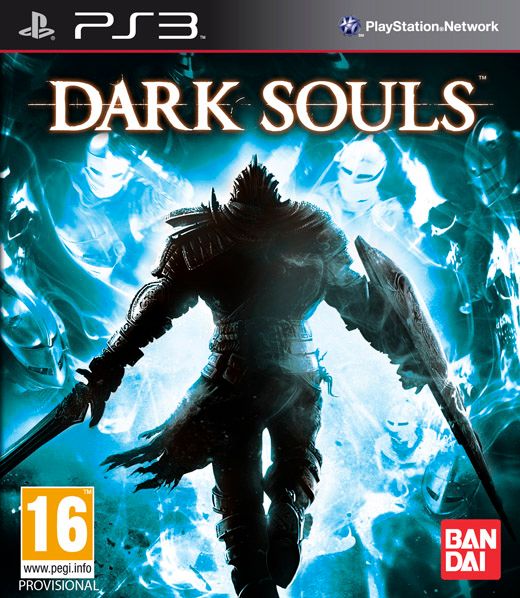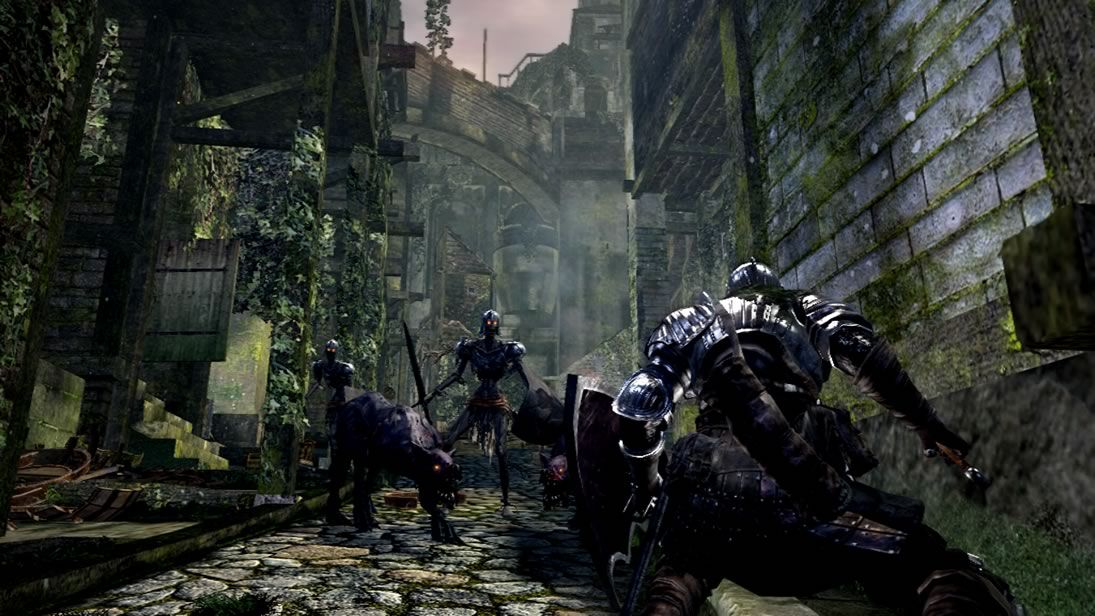The fall rush of supposed must-play games has come and gone, and much of us have reveled in a world of gaming bliss. Indeed, this quarter has treated gamers amazingly well, with a huge variety of undeniably deep, enriching experiences. However, there is unfortunately a flip side to this flood of AAA releases that most gamers and many of us even in the industry fail to realize: there's bound to be one or two games that are just as amazing and fantastically memorable, but get pushed to the wayside in favor of the newest, flashiest object.
This year, that game unfortunately seems to be Dark Souls, arguably one of the most challenging, frustrating experiences of my adult gaming life, and arguably the second best game I've played all year.
I’m sure most of you have already heard of Dark Souls, but here’s a refresher: it’s the spiritual successor to From Software’s Demon’s Souls, an RPG that’s off-the-scale and unbelievably old-fashioned in terms of difficulty. When it comes to the structure, gameplay, and combat of the game, Dark Souls is most reminiscent of the Monster Hunter series; you create your own character at the forefront, equip him with better armor and weapons as the game progresses, and must become comfortable with a seemingly clunky combat system before becoming an absolute master at the game.
Fair warning, I’m going to be gushing about the positives of the game, so I might as well air out the very few negatives before delving into what makes Dark Souls one of the best of the year. Perhaps the most glaring issue is the plot; if you’re looking for a Mass Effect-esque RPG that’s heavily plot-driven, this is the absolute wrong game for you. Dark Souls is a signature case of heavy, deep gameplay over an enriching, emotionally satisfying plot; the narrative essentially amounts to something slightly reminiscent of a more dastardly Lord of the Rings. It’s not too important and can be heavily overlooked, but as mentioned, if you’re looking for a game that delivers in an engaging story, you’re not going to find it with From Software’s opus.
Further drawbacks include the somewhat blandness of the actual world around the game. While you’ll be battling enemies and massive bosses in fairly varied areas, as a whole the color pallette and settings are so washed out and generic that you’ll often wonder if you stumbled into a medieval PC game from the early 2000’s. The setting feels like your typical, nondescript historical-yet-incredibly-inaccurate medieval environment often found in “epic” action-adventure games these days; just imagine something from the Assassin’s Creed series, except considerably more mundane and uninspired, and you have Dark Souls.
None of those detract from the game at all though, because 90% of your focus isn’t going to be on the graphics or plot, but rather on trying your damnedest to not die for the bajillionth time. This is old-school gaming personified, where one mistake can prove fatal to your ultimate goal. It’s already been said numerous times in this review before, but the key word here is depth. Dark Souls is like a nigh-unpenetrable onion of gameplay; there are layers upon layers of depth that, to this day, I have not understood, and probably will never understand even when I finish the game.
The combat is deceptively simple: you can arm a weapon in your right hand, which has a light and a heavy attack. You have the ability to dodge roll, along with a parry mechanic that’s simple in concept, but difficult to master. On top of that, you can choose to either equip a second weapon, or equip a shield to your left hand; it is entirely your choice. of course, this all depends on the statistics of your character; if you aren’t strong enough to wield that axe or shield, your limp noodle arms won’t be able to do much with the weapon, and leave yourself wide open for assault and imminent death. That also translates to equipping armor as well; in Dark Souls, anything equippable actually has quantifiable weight to it. If your character equips clunky, heavy-plated armor, you’ll notice a marked decrease in speed and agility; watching a heavily equipped character try to dodge roll is like watching a fat guy do a somersault, and not in a funny way.
When it comes to actually fighting enemies, simplicity also gives way to a much more complex experience. The strategy for all the enemies, be it peons or ridiculously huge bosses, essentially boils down to memorizing patterns, being patient, and dodging and/or parrying when you must, but Dark Souls ups the ante by making the player instantly lose all of their souls they’ve collected so far. As you mow through enemies, you gather souls, which are pretty much the universal currency for everything in the game. You use souls to purchase, well, everything; that includes your weapons and armor, and more importantly, your experience and levels. Yes, among other things, souls are used to level up your character and maximize the inherent abilities of your heroes. Needless to say, that makes them just a tad bit vital to your success, and makes death an actual punishment and something to dread. There are way too many games these days that make death nothing more than a “restart from the last checkpoint” re-do, with nothing more than a minor loss in currency as a result; Dark Souls makes death serious, and most importantly, conditions the player to avoid it at all costs, much like the old-school games of yore.
There’s no blaming the game or any of its problems with the combat system either; when you die, it is 100% your fault, and there is absolutely no denying it. Dark Souls is one of the very few games that gives you all the tools you need to succeed; if you fail repeatedly, it’s all on you and your abilities, rather than on the game’s nonexistent crutches. When you get bumrushed by a group of soldiers and end up dying, you can’t blame the dodge system, or the combat system; you probably shouldn’t have run into that room like an idiot and attracted the attention of all the soldiers idly standing on alert. When you’re up against that giant butterfly and you lose 20,000 souls after getting hit by one of its seeking energy projectiles, it’s impossible to blame the boss for its “cheap” attacks; maybe you should have dodged the projectiles in time, which shoot in a pattern that’s relatively easy to learn.
That overwhelming sense of responsibility may sound like an instant turn-off for most of you, but personally, that is a big part of what makes Dark Souls one of the best games of the year. Not only is it absolutely refreshing that death is elevated to such serious business, but for a game to be so meticulously produced that all of the accountability of said deaths are placed solely in the player’s hands? I can’t even remember the last time I died in a game and thought to myself, “well, that was 100% all on me; there was nothing wrong with the game and its current circumstances, I just need to stop sucking”; I was thinking that after every single death in Dark Souls.
I haven’t even touched on the Humanity system, which allows other players to enter the game and either help or destroy you, or the clan mechanic called the Covenant system, wherein you can choose to join specific alliances, all of which have certain goals and benefits upon joining, such as learning specific kinds of magic and other useful abilities. All of those are amazing additions to an otherwise stellar game, and yet again add another layer to that gameplay onion of depth. Personally, I didn’t play around with those too much, not because they weren’t fun, but because I had my brain firmly concentrated on not dying and learning from my previous mistakes.
Fact of the matter is, even without those two features, Dark Souls is absolutely one of the best of the year, and absolutely one I’ll fondly remember. This is not a hard game dictated by cheap boss fights, stupidly awkward platforming, or quantity-over-quality battles; Dark Souls is one of the few that actually teaches the player to play the game, rather than fight its shortcomings. I’m at about 60 hours of gameplay, and I feel like I haven’t even come close to beating the game by far. Now that the holidays are here and I finally have some time, I am most certainly going back to get my ass handed to me, and unlike other games, I will somehow enjoy losing over and over and over again. If a game can make me learn from my mistakes and make me a better player over time, how can I not admire it as an utter achievement in a year of absolutely phenomenal games?
Dark Souls
- Franchise
- Dark Souls
- Released
- September 22, 2011
- Developer(s)
- From Software
- Publisher(s)
- Namco Bandai
- Genre(s)
- Action RPG
- ESRB
- M for Mature: Blood and Gore, Partial Nudity, Violence


